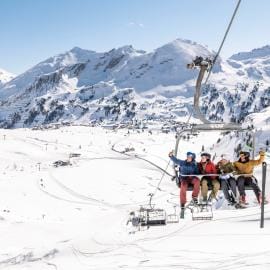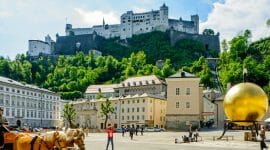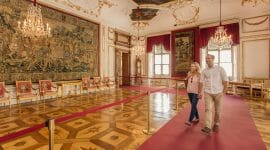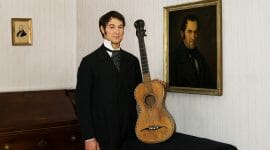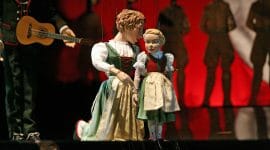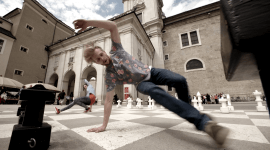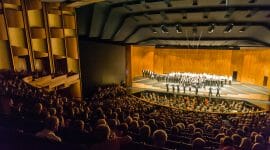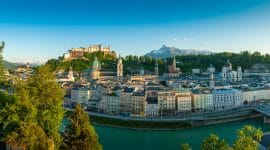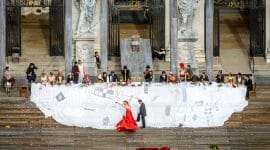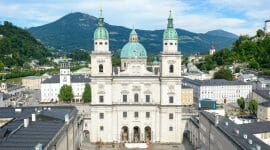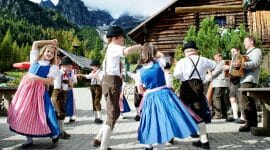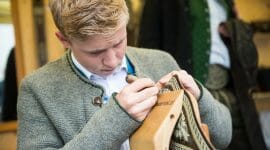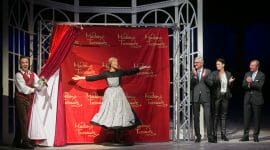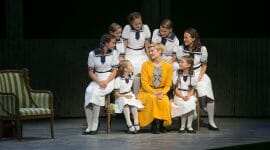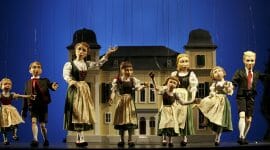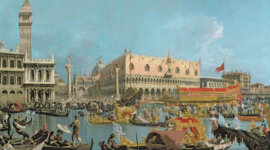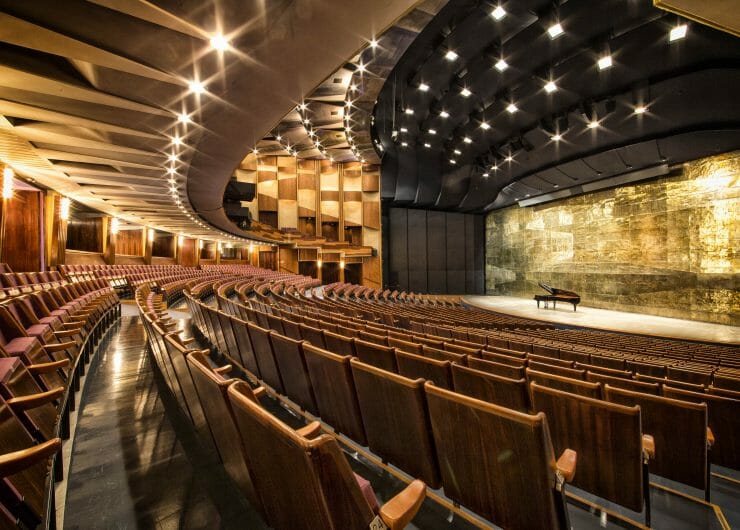
At the beginning of April, Salzburg is transformed into the classical music meeting place for music lovers. The Salzburg Easter Festival, one of the most attractive and best classical music festivals in the world, will take place from 12. to 21. April 2025. Here you will find all details about the Easter Festival.
Artistic Director Nikolaus Bachler presents a particularly diverse programme for the Salzburg Easter Festival 2025. For the first time in the festival’s history, four conductors and three orchestras will be featured. At the center is a new production of Modest Mussorgsky’s monumental drama “Khovanshchina”, staged by British actor and director Simon McBurney. Esa-Pekka Salonen will conduct staged opera for the first time in six years and will be at the helm of the Finnish Radio Symphony Orchestra. The Finnish conductor and composer will also lead two concert programmes with music by Jean Sibelius, Gustav Mahler and himself. Three further concerts with the Mahler Chamber Orchestra and the Mozarteum Orchestra will be conducted by Gianandrea Noseda, Maxim Emelyanychev and Tabita Berglund. “In view of the current world situation, we don’t want to do business as usual in Salzburg. Under the motto Wounds and Wonders, everything revolves around the wounds that are currently being inflicted on our society and our world – be it in Ukraine, in Isreal or in populistled states in Europe and the world,” says Nikolaus Bachler. “But we also don’t want to ignore the miracles or wonders – both in the religious sense and in the hope for a better future.”
Here you will find all details on the current programme of the Easter Festival: www.osterfestspiele-salzburg.at
New Production: Modest P. Mussorgsky “Khovanshchina”
The focus is on a new production of »Khovanshchina«, the monumental “folk drama” by Russian composer Modest Mussorgsky, which paints a shockingly topical picture of the Russian political and church elite brutally fighting each other at the expense of the population – it depicts chaotic conditions, turmoil and devastation. Mussorgsky wrote the libretto of this music drama himself in order to depict “the past in the present”. He compiled it from hundreds of fragments of text, including private and state documents from the 17th century and scraps of Church Russian. After about 10 years of work, he died in 1881, leaving the piano score of this vast piece and a few fragments of orchestral score. Most importantly – the ending was missing almost in its entirety. The first performing version of the whole opera was completed by Mussorgsky’s friend Nikolai Rimsky-Korsakov in 1882, for which Rimsky provided an ending. In 1913 a new ending was added by Igor Stravinsky for Sergei Diaghilev and the Paris performances as part of the “Ballets Russes”. Finally, in 1958, Dmitri Shostakovich made his orchestration from an edition of Mussorgsky’s sketches by scholar Pavel Lamm and composer Boris Asafiev and added his own new ending – from then on, Shostakovich’s version has dominated the opera-houses of the world.
Orchestral concert I
The first Orchestral Concert under the direction of Esa-Pekka Salonen features Jean Sibelius, the Finnish national composer par excellence, with his 2nd Symphony. The conductor combines this with his Cello Concerto: »As always, I like to show the solo instument in different rows: of course the concertante aspect is always there, but it does not stay the same: it’s sometimes complety alone, sometimes it’s being looped and sometimes the cello becomes a chamber music partner.« The piece was composed for Yo-Yo Ma, who premiered it with the Chicago Symphony Orchestra in 2017. At the Easter Festival, the young Finnish cellist Senja Rummukainen will play the solo part.
Orchestral concert II
The young Norwegian conductor Tabita Berglund makes her Salzburg debut conducting the second Orchestral Concert and, together with the musicians of the local Mozarteum Orchestra, creates an evening of arias and duets from operas such as “Macbeth”, “Andrea Chénier” and “Rusalka”. The singers are Sondra Radvanovsky, SeokJong Baek and Simon Keenlyside. From October 2024, Berglund will be Principal Guest Conductor of the Detroit Symphony Orchestra.
Orchestral concert III
In the first of two concert programs by the Mahler Chamber Orchestra, Gianandrea Noseda conducts music by Edvard Grieg, Peter Tchaikovsky and Dmitri Shostakovich. After Grieg’s famous “Peer Gynt” suite, the programme includes Tchaikovsky’s Violin Concerto in D major op. 35 with soloist Augustin Hadelich, before the evening ends with Shostakovich’s 9th Symphony. Noseda is currently General Music Director at the Zurich Opera and Chief Conductor of the Washington National Symphony Orchestra.
Choral concert I
For the first of two Choral Concerts, Esa-Pekka Salonen programs Gustav Mahler’s 2nd Symphony, the so-called “Resurrection Symphony”. “It’s a journey that is very unlike any other piece of music – it starts from a dark place and goes through versious side-roads to the finale, where Mahler kind of gives us the keys to understand why we are on this planet,” says the conductor. Salonen last conducted this work in a staged production by Romeo Castellucci at the Festival d’Aix-en-Provence in 2022.
Choral concert II
One of Felix Mendelssohn Bartholdy’s best-known pieces – the oratorio “Elijah” – is on the program of the second Choral Concert. It tells the story of the prophet Elijah and focuses on the conflict between poly- and monotheism. Maxim Emelyanychev, born in Dzerzhinsk, Russia, in 1988, is considered one of the most exciting conductors of the younger generation. He recently made his debut with the Royal Concertgebouw Orchestra in Amsterdam, the Berlin Philharmonic Orchestra and the Bavarian Radio Symphony Orchestra. The title role will be sung by Andrè Schuen, known to Salzburg audiences from “Così fan tutte” and “Le nozze di Figaro”, for example.
Dance & Electro
The Easter Festival intends continuing the newly founded dance and electro programme in 2025, and will be inviting internationally known artists to engage with the topic Wounds and Wonders. Details will be announced at a later date.
Herbert von Karajan – Salzburg’s great conductor
The Salzburg Easter Festival was above all the product of a single Salzburger: Herbert von Karajan. After studying at the Mozarteum and in Vienna, he conducted the Mozarteum Orchestra for the first time at the age of 20. From this first appearance, it was clear that his path would lead to the very top. From 1960 onwards, Karajan was an integral part of the Salzburg Festival. When, seven years later, with the founding of the Easter Festival, whose leading thereof took over his life, he created a monument not only to himself but also to the music scene in Salzburg.
Exceptional quality
Karajan’s explicit wish and expectations was to only have the best on stage. It had been a conscious decision to keep the Easter festival smaller than the Salzburg Festival as this was the only way they could guarantee unique performances from world-class musicians. Karajan was renowned and respected for his perfectionism. He took the opportunity to use “his” Berlin Philharmonic Orchestra and his many contacts around the world to get only the best musicians and singers.
Here you will find all details on the current programme of the Easter Festival: www.osterfestspiele-salzburg.at
The artistic directors of the Easter Festival
The high quality of the Easter Festival continued even after Karajan was no longer there. One of the main reasons were the chief conductors of the Berlin Philharmonic Orchestra, who were also automatically responsible for the artistic direction:
-
-
- Herbert von Karajan: 1967 (founding) until 1989 (Karajan’s death)
- Sir Georg Solti: Solti assumed the artistic direction in 1989 after Karajan died, shortly before the festival, and then worked at the Salzburg Festival. In 1992/93 he took over the artistic direction of the Easter Festival.
- Claudio Abbado: Abbado became the artistic director in 1994 and expanded his first Festival with the series “counterpoints” (“Kontrapunkte”): chamber orchestras with members of the Berlin Philharmonic Orchestra collaborating with first-class soloists.
- Sir Simon Rattle: The curly-haired Brit took over in 2003. After ten seasons, his time and the time of the Berlin Philharmonic Orchestra came to an end.
- Christian Thielmann: The Sächsische Staatskapelle Dresden came to Salzburg after the change.
-


